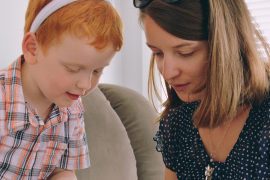Helpful advice
He is diagnosed as suffering from “wind”, stomach spasms, gastro-oesophageal reflux, lactose intolerance, and food sensitivity. To fix it, he is given everything from anti-reflux drugs to chamomile tea, Mother is advised to stop dairy in her diet, or stop breastfeeding completely. She is advised to wind him properly all the way through to massaging his stomach (in a clockwise direction) with warm olive oil. And proffered the worst piece of advice possible: “Just you let him cry it out”!
Sucking To Calm
What’s a baby to do?
SUCKING
Upset babies find sucking calms them down and no doubt it does. Neuro-chemists tell us that when a baby sucks, his brain secrets ‘beta endorphin’ (a opiate-like neurotransmitter). So our baby starts to feed frequently, sucking, sucking, sucking in an effort to calm himself down. Despite having a full stomach after a good feed the sucking and milk intake continues and in combination with the straining, soon becomes reflux vomiting. His parents take him to the hospital where is given a barium meal, or an oesophageal pH probe study and diagnosed with GORD (gastro-oesophageal reflux disease) and treated with Zantac (and H2-antogonist drug), Losec (a proton Pump inhibitor drug), and/or taken off the breast because “the flow is too fast”.
WIND
After birth, babies swallow lots of air, which passes to the stomach. The valve between the oesophagus (gullet) and the stomach is a ring of muscle, which in babies is hopelessly incompetent and hangs open: it can hardly trap a feed (hence most babies posset/vomit), let alone trap an air bubble. So if the baby swallows air, he can easily burp it up. Hence:
- All babies reflux. Studies show that stomach contents are refluxed up into the oesophagus on average about 20 times a day.
- Babies don’t need burping. That is not to say babies do not like to be sat up and patted (at maternal heart rate) but they are doing it for comfort, not to help them burp.
Crying ‘colicy’ babies swallow more air- so if you pick them up they may burp. But he’s not crying because he needs burping – he’s burping because he’s crying…
And at the other end, once babies start milk feeding, the germs in the large bowel ferment the lactose to produce litres of hydrogen gas as a by-product. This fills the lower bowel, and hence babies tend to fart like troopers (apologies to our Armed Forces). The bowel is a long fleshy tube open at each end, filled with liquid contents. No pain, no distension. All babies are windy. But they don’t SUFFER from it.
However there is a reasonable chance that someone will suggest your windy baby is suffering from ‘lactose intolerance’ and you should stop breastfeeding and start a lactose-free formula. Take no notice of this advice unless your baby has had a recent bout of viral gastroenteritis, only then is it possible. That is not to say that your baby’s poos aren’t explosive and gassy. They often are in normal breastfeed babies. Lactose is nearly the only sugar in mammalian milks and if you have great supply there may be too much for the baby’s gut to absorb. It spills into the colon and ferments, producing lots of hydrogen gas and liquid poos. It’s normal.
DAIRY SENSITIVITY
Nowadays it is also likely that it will be suggested that your baby might be sensitive or allergic to cows milk protein. True, 5% of babies develop this but most of them are formula fed (with cows milk formula). Occasionally however breastfed babies can react to small parts of the dairy protein in the mother’s diet which is secreted into the breastmilk. So it is reasonable to try a period of a couple of weeks avoiding dairy products.
“Medicalising Normality”
There was an editorial in the Australian Paediatric and Child Health Journal titled
“Medicalising Normality” aptly describing what is happening here. All these medical diagnoses tend to flow from a series of vicious cycles triggered by the extra sucking and the baby’s behaviour, but all downstream from the true cause of the distress.
There is a condition I call “Christmas Colic” when babies do this in spades. Too many relatives, too many parties, too much excitement leading to lots of screaming babies in Emergency Departments in late December.
How do we fix the problem? It is simple in principle and tough in practice. We have to reduce the level of, especially visual stimulation, in the babies environment to a level he can cope with, and do it for long enough to calm his active stress response.
In a phrase we have to “Bore Him to Sleep”.
Calming the baby regime
- If the grandparents insist on winding your baby up, send them home. Otherwise get them to help you by joining in with this plan. Alternatively, if you have a toddler, they would be delighted to help by looking after her.
- Stick a note on the front door saying that you are out.
- Go into her room, draw the blinds and make the light in the room dim. Put on some quiet, restful music; that’s for you, but babies do like a background of ‘family sounds’ rather than silence.
- Get the baby and take her into the room with you. NEVER leave her on her own.
- Feed her on demand in the dim light, avoiding long periods of intense eye contact with her (obviously you can look at her – but make your gaze calming).
- Put her on your chest with her ear against your heartbeat and cuddle her until she settles. This reminds her of the sounds and feel of the womb. It may take some time. Be patient.
- You can now wear her on your chest for as long as you both like.
- Lie down with her on the bed, making sure that if you fall asleep that there are no risk factors for SIDS in your sleeping arrangements. Check out the risk factors beforehand.
If you need to get away for a short while:
An inconsolable baby can press all your buttons. It can be quite overwhelming. It’s okay to get someone else to take over from you. They can take over the cuddling, calming and holding.
If there is no-one to help you and you need to get away:
- Wrap him firmly in a sheet. Wrap him with his back rounded and his limbs contained – this will also remind him of the containment of the womb and help him feel secure. He may want to have his arms free, but it is preferable to contain them.
- Then place him in his cot. Pat him gently on the bottom at about 70 pats to the minute (mother’s heart rate) and just …
Bore your baby to sleep
- If it helps, give him a dummy.
- If he gets upset (and he probably will), rewrap him and put him back on your chest, continue cuddling, or feeding.
- If you’re both going crazy, pick him up and cuddle him for a while. You can then try the cot again.
- Continue this until he settles. Do not leave the baby to cry, but you can leave the room when he finally sleeps.
- Generally the early hours are hard, but if you persevere, things will improve. He will eventually start to, as the psychologists say, ‘return to base’.
- By the second day he will be calmer. Do not take him out of the room, even though he appears improved. Give it another day, to be sure he loses some of his fatigue and stress.
- The more he sleeps, the less opportunity there is for him to be stimulated, and the more he will sleep. This is a good cycle, not a vicious one. When he’s calm and sleepy, you can return him to the family room.
- You then need to keep the activity and stimulation in his environment down to a level that he can handle. If he develops jerky movements, or looks stressed, return to the calm room.
How much stimulation your baby can cope with depends on his basic temperament. All babies are different.
There are a few babies who are calm from the moment they’re born. These babies can be taken to your workplace and meet a hundred people and not get upset. Most babies though, have a limit, – you need to find out where your baby’s is, and keep the level under that.
Some super-sensitive babies find life difficult if they aren’t clamped to their mother’s chest for the first three months of their life. Don’t worry; they won’t suffer from sensory deprivation. They are learning their most important lesson: how to keep themselves calm and feel secure.
I wish you good luck (and enough sleep)!
Originally Published HERE
Dr Howard Chilton has been a neonatologist for more than 40 years and was Director of Newborn Care at the Royal Hospital for Women for over 20 of them. He continues to practice there, at the Prince of Wales Private Hospital and in the Northern Rivers region of NSW. He is heavily involved in responsive parenting education about which he hosts regular talks and workshops. He also writes a blog on his website (www.babydoc.com.au) and Facebook (www.facebook.com/howardchilton). He has written a number of parenting books, in print is “Baby on Board” now in its third edition and the latest, “Your Cherished Baby” is published by Pan Macmillan Australia.










